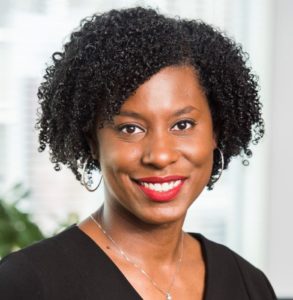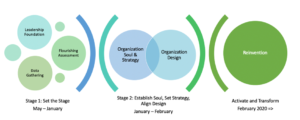Looking to the Future in a Time of Uncertainty
PEP FOCUSES ON THE FUTURE BY LAUNCHING A STRATEGIC PLANNING PROCESS THAT EMBRACES ANTI-RACISM AS CENTRAL TO TRAUMA-INFORMED PRACTICES
Contributed by Habeebah R. Grimes, PEP Chief Executive Officer
Imagining Our Future When We Are Managing Loss
 Finding stability in today’s world as plans shift dramatically in response to COVID-19 has become a strategic challenge unto itself.
Finding stability in today’s world as plans shift dramatically in response to COVID-19 has become a strategic challenge unto itself.
This pandemic has reminded us that the children we serve at Positive Education Program face incredible odds. Trauma and adversity, poverty and systemic racism place them in a vulnerable position on even the best day. Headlines and emerging data tell us that children impacted by these realities are experiencing a widening opportunity gap as a result of the pandemic. Rates of anxiety, depression, suicide, and suicidal thinking among youth, which have been rising for nearly a decade, make the reality of a mental health pandemic on the other side of this pandemic a terrifying consideration.
In these trying times, it is critically important that we focus on the future. As challenging as it may seem, we are at a juncture that makes the work of strategizing more essential than ever to the future of the organization. Imagining and exploring what possibilities exist for PEP is essential in this time. We must dedicate time and resources to determining what is needed from PEP and the ways PEP can leverage its experience and expertise in service to our region’s most vulnerable kids and families.
Centering Equity in our Strategy Work
PEP has invested itself in developing and embedding expertise in trauma-informed work and practices. Our embrace of The Sanctuary Model and our certification in the Neurosequential Model have fortified our practices and helped us further operationalize Re-ED.
It has become glaringly evident to me that we cannot truly consider our work trauma-informed if we are not also anti-racist and anti-oppressive in our practice of trauma-informed care. The history we know makes this essential.
There was a moment for me during Dr. Sandra Bloom’s initial presentation of the Sanctuary Model to PEP staff when I wondered: how we might look at the findings of the ACEs Study through the lens of our nation’s history of racism?
In so many ways, systemic racism creates and sustains the painful conditions for childhood adversity and trauma. The displacement and genocide of Indigenous Americans, and the centuries-long dehumanization of Black people, made worse by codification of those practices into law, have surely created physiological and psychological effects that carry forward.
In order to envision delivering services to kids and families in an equitable manner that prevents us from further traumatizing those we serve, we have to ensure that we are mobilizing the tools of anti-racism and anti-oppression in our role as an educator, a mental health provider, as an employer, and as a developer of professionals in our fields of expertise.
We must learn where inequities exist in our systems and practices and secure expert recommendations for how we might address them. Our current frameworks necessitate that we enter the space of anti-racism and anti-oppression with the intent to lead by example, treating one another in the ways we want our kids and families to be treated.
We have a responsibility to lay bare what we learn, to contextualize and then make changes, allowing us to move from the important place of revelation to revolution.
Our Process and Partners in This Work
Our strategic planning will be facilitated by Sally Parker with TimeZero Consulting. Her approach appreciates that we all are living in a volatile, uncertain, complex and ambiguous (VUCA) world. In our VUCA world, the traditional “predict and plan” models do not work. These times call for a “living systems approach” where we must view PEP as a flourishing living system that is resilient, self-organizing and naturally hierarchical, able to both sense what is happening in its surroundings and respond.
The PEP strategizing process has three basic stages as illustrated below. We are currently in the data gathering stage, which will establish the foundation for both organization strategy and design.
The Strategic Planning Steering Committee is co-chaired by me and our PEP Board Chair, Noreen Kilbane. The committee includes PEP’s Executive Team and six members of our PEP Board. Throughout this process, there will be opportunities for staff inputs and engagements, particularly in service to our diversity, equity, inclusion and belonging (DEIB) work.
The DEIB work will be supported by two different consultant groups. Equius Group, led by Erika Merritt, will be working with PEP to do an equity audit and leadership development work. Sankofa Circle, led by Dr. Shemeriah Arki and supported by Dr. Sherrae Mack, will focus its work on our educational and mental health programming through this lens.
What We Hope to Learn and Where We Hope to Go
Through this process, we will learn where we are doing well, where we can do better, and where we might release and rebuild.
We will imagine a world where services like ours are less necessary. Working from this premise, we will ponder how our work might look different should we choose to invest ourselves in finding ways to end those social determinants of health that lead to devastating outcomes for our kids and families.
This process will help us find ways to braid the work of anti-racism and anti-oppression into our other core foundations so that we can disrupt the displacement of children with disabilities from their communities. It will help us discover how our current leaders can lift up future leaders, making certain that our learning flows in all directions so that we are constantly wearing a lens that promotes equity and justice.
The environment is constantly changing and asking more of us, imploring us to respond to what we’re sensing in the environment with courageousness and a willingness to respond. It is my hope that our strategic planning work will strengthen our capacity for constant adaptation and agility so that we nurture our collective capacity to continuously strategize and imagine possibilities.
We are living through volatile, uncertain, complex and ambiguous times. Knowing in my heart that PEP has the capacity to emerge from these days as a flourishing living system fuels my belief in a bright future for PEP and for the children and families who come into our care. I look forward to charting this course with all of you.

